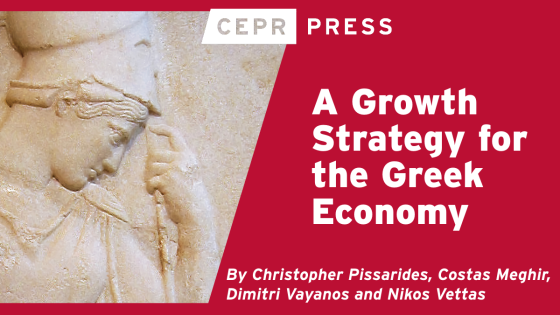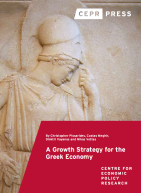For Greek incomes to systematically increase and converge to EU averages, progress should be made in two broad areas. First, labour market participation should increase, especially by women and the young, where Greece lags significantly relative to EU averages. Second, labour productivity should increase. Productivity growth requires business investment, which in Greece has been languishing at about 50% of the EU average. It also requires the integration of innovative production methods and new technologies, where Greece has also been lagging. As these activities require a high degree of specialisation and the domestic market of a small country like Greece is limited, Greece’s export capacity should improve.
We argue in the report that to achieve progress in the above areas, the Greek economy should be made a more open system with simpler rules and fewer restrictions. There are two aspects to this. First, the tax and social security burden on formal employment should decline, and the formal and informal barriers that firms face when entering markets and expanding in them should be lowered. Second, the public sector should offer improved levels of social safety nets, education and continuous training to the labour force, thus facilitating innovative activity and a better connection with the evolving needs and opportunities of the labour market. Making the economy more open would favour segments of the population who are at a disadvantage, such as women and the young, and would enhance social mobility.
The policies that we recommend in the report can be divided into four sets. A first set of policies seek to improve the business environment by reducing the tax and social security burden on formal employment, and by reducing the regulatory and administrative burden that results from the complexity and lack of transparency of the institutional framework.
Examples of policies in that set are: reform taxes and social contributions to lower the extremely high marginal tax rates at middle incomes; tax all incomes on the same scale regardless of their source; provide more incentives for electronic payments to fight tax evasion; establish a funded pillar in the social security system and accordingly reduce the dominant pay-as-you-go pillar, to achieve a tighter connection between the social security contributions that employees pay and the pensions that they ultimately receive; strengthen mechanisms to codify and evaluate legislation; incentivise and empower civil servants, especially at the higher echelons, so that the public administration becomes less pliable to politicians and more efficient; speed up the allocation of justice through measures such as expanding the scope of specialised courts for cases of economic interest, providing expert assistance to judges, and expanding out-of-court settlements; strengthen financial supervision especially in the area of investor protection; improve the legal framework on bankruptcy and corporate governance; accelerate the development of the land registry and urban zoning plans; and transfer more responsibilities and funding to local governments.
A second set of policies seek to strengthen social cohesion through an improved access to a dynamic labour market for all, a universal access to high quality education and health services, and a targeted system of social benefits for the more vulnerable.
Examples of policies in that set are: develop a system of pre-school care and education to improve child development and facilitate the participation of women in the labour market; provide more autonomy to school units and universities, while also improving their governance; develop primary healthcare; provide more autonomy to public hospitals and develop a system to evaluate their performance; redesign the training system for the unemployed and the employed by providing more incentives and financing; and improve the structure and targeting of social benefits so that job search is better incentivised.
A third set of policies concern better infrastructure through public and private investment. These policies include the upgrade of digital infrastructure; the energy upgrade of buildings; the development of renewable energy infrastructure; the upgrade of the central rail network; the upgrade of export-oriented ports; and the improvement of rail and road access to the borders to facilitate international trade and better capitalise on Greece’s geographical position.
A fourth set of policies concern individual industries and sectors of the Greek economy. These policies refine some of the previous policies, recognising that the priorities differ across groups. They include measures to lower production costs in manufacturing, such as accelerated tax amortisation for investment in equipment, higher working-time flexibility and lower energy costs; to encourage basic research at universities and their connection with firms; to improve the quality of tourism services by upgrading infrastructure, digital services and employee training; to support investments by small and medium firms that enhance openness and digitalization.
The report of the Pissarides commission has had considerable impact. It has guided parts of government policy, especially in the areas of tax reform, social security reform, and labour market policies. It has also been serving as a point of reference in the public debate about economic reforms.
The Greek economy is currently on a strong recovery path. Maintaining high growth rates over the medium term, however, depends on implementing structural reforms within a continuous transformation process. The report thus remains as relevant today as it was when it was first presented to the Greek government. It is sufficiently general and all-encompassing to also be of relevance to other economies seeking to improve their economic performance in today’s open international markets.
References
Doxiadis, A (2011), “Greeks Behaving Badly? The Micro-Origins of Crisis and Revival,” invited lecture, Yale University.
Ioannides, Y and C A Pissarides (2015), “Is the Greek Crisis One of Supply or Demand?”, Brookings Papers on Economic Activity, Fall: 349-373.
Meghir, C, D Vayanos and N Vettas (2010), “The Economic Crisis in Greece: A Time of Reform and Opportunity”.
Meghir, C, C A Pissarides, D Vayanos and N Vettas (eds) (2017), Beyond Austerity: Reforming the Greek economy, MIT Press.
Pissarides, C A (2015), “Structural Perspectives on European Employment: The Role of Innovation and Growth”, in Inflation and Unemployment in Europe: Conference Proceedings, ECB Forum on Central Banking, Sintra, Portugal.
Pissarides, C A (2016), “Rebooting Europe: Closer Fiscal Cooperation Needed”, in R Baldwin and F Giavazzi (eds), How to Fix Europe’s Monetary Union: Views of Leading Economists, VoxEU eBook.
Pissarides, C A, C Meghir, D Vayanos and N Vettas (2020), “Σχέδιο Ανάπτυξης για την Ελληνική Οικονομία”.
Pissarides, C A, C Meghir, D Vayanos and N Vettas (2023), A Growth Strategy for the Greek Economy, CEPR Press.







